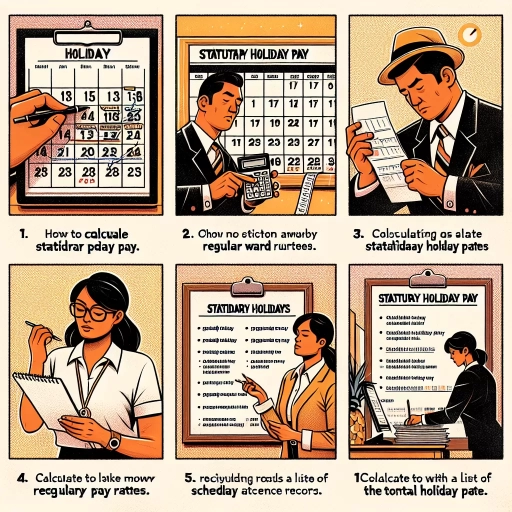How To Calculate Stat Holiday Pay

Understanding Statutory Holidays, Its Importance, and Regulations
The Concept of Statutory Holidays
Statutory holidays or stat holidays are public holidays recognized by law. These holidays ensure that employees receive their regular pay, having the day off, or receive additional pay if they work on these holidays. The concept of statutory holidays varies across regions, with each country or state having its unique holidays and regulations. Knowing about these holidays is critical to ensuring fair treatment at work and understanding the pay you are entitled to during these special days.
Importance of Statutory Holidays
The importance of statutory holidays cannot be overemphasized. Apart from the relief and rest these special days bring, they also hold significant economic implications. Research shows that employees who have beneficial vacation rights and holidays tend to be more productive and offer better services. As such, these statutory holidays play a crucial role in the overall well-being and productivity of employees and, indirectly, the economic performance of organizations.
Regulations Surrounding Statutory Holidays
Typically, statutory holidays are governed by labor laws and regulations. These rules determine which holidays are recognized, the conditions for eligibility, and the pay entitlement of employees who work on these days. The regulations also stipulate the penalties for employers who fail to comply. It's essential for both the employer and the employee to understand these regulations to avoid potential disputes and promote a fair working environment.
Calculating Stat Holiday Pay: A Step-by-Step Guide
Understanding Your Eligibility
Before diving into the calculation of statutory holiday pay, you first need to understand your eligibility. Not every employee is eligible for stat holiday pay. Full-time employees generally qualify for these payments, but part-time or casual employees might have different eligibility criteria based on the laws of the jurisdiction where the business operates. For instance, some jurisdictions may require employees to work a certain number of days before they become eligible for statutory holiday pay.
Use of an Average Day's Pay as a Basis
Most jurisdictions base the calculation of stat holiday pay on an average day's pay. This rate is typically calculated by adding up the total wages earned in a certain period (excluding overtime) and dividing it by the number of days worked in that period. The formula and duration can vary from region to region. It is crucial to consult local labor laws or a labor expert to ensure you have the correct information.
Calculating Pay for Working on a Statutory Holiday
Most jurisdictions provide extra compensation to workers who choose or are asked to work on statutory holidays. This pay is usually a combination of the regular holiday pay and a premium pay for all hours worked on that day. The exact method for calculating this pay may differ. Therefore, it's important to acquaint yourself with local labor laws or consult with a labor expert for an accurate calculation.
Common Mistakes in Stat Holiday Pay Calculation and How to Avoid Them
Inaccurate Calculation of 'Day's Pay'
In calculating a statutory holiday pay, it's key to correctly calculate a 'day's pay'. Errors can occur if the employer uses incorrect periods to calculate an average day's pay or if all eligible earnings, including commissions and non-discretionary bonuses, are not considered. To avoid these errors, ensure you are aware of what constitutes a day's pay as per your local regulations.
Omission of Eligible Workers
Another common mistake is the omission of eligible workers when calculating statutory holiday pay. This can occur when employers wrongly classify employees as ineligible. It's important for employers and employees alike to understand who qualifies for statutory holiday pay to prevent this mistake.
Non-Compliance with the Law
The laws surrounding stat holiday pay can be complex and can change frequently. Some employers may not be up to date with these changes, leading to non-compliance. To avoid this, it is recommended to continually check for updates and possibly seek legal advice if needed.